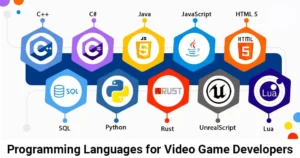In the 21st century, the game business has grown into one of the most interesting and fast-paced places to work. With so many people around the world and more powerful creation tools coming out, it’s easier than ever to become a game creator. Still, a lot of people who want to be makers don’t know where to start, what skills they need, or what tools will help them make their ideas come to life. At first, the road may seem too hard to handle, but anyone with desire and the right help can turn their imagination into a fulfilling job in game development. This guide talks about the most important skills you need, the best tools to learn, and the different job options for coders in 2025 and beyond.
How to Know What a Game Developer Does
A game developer’s job is to take ideas and turn them into digital experiences that people can connect with. Depending on their job, developers may code the rules of a game, create characters and settings, come up with plots, or tweak the project’s sound and graphics. Some developers work on small independent games and do a lot of different things, while others work for big companies and have clear jobs. The goal of all game makers is to make games that are fun, interesting, and memorable.
How to Make Games: The Most Important Skills
Making games takes both technical know-how and artistic thought. Developers often use languages like C++, C#, or Python to build systems and processes, so they need to be very good at programming. Problem-solving skills are also very important because writers are always having to deal with problems like improving speed or making sure that the game runs smoothly on all devices. Also, creativity is very important because games are more than just software; they’re experiences that pull you in and need interesting worlds, characters, and stories.
Along with professional and artistic skills, it’s important to be able to work with others. A lot of the time, artists, designers, coders, and testers work together on big teams to make games. Developers do well in these kinds of settings when they can communicate well and change with the times. Lastly, persistence and interest are important traits because technology and player standards are always changing, which means coders have to keep learning and getting better.
Software and tools for making games
Today’s tools make it easier than ever to start making games, which is good news for people who are just starting out. Engines like Unity and Unreal Engine are now standard in the industry because they have both strong features and resources that are easy for beginners to use. Unity is known for being flexible and having a lot of paperwork, which makes it great for projects on phones, computers, and even game consoles. Unreal Engine, on the other hand, is often used for high-end AAA games because it has amazing images. Developers can make prototypes and full games with both systems without having to start from scratch.
In addition to game engines, people who want to become developers should use visual design programs like Blender for 3D models, Photoshop or GIMP for artwork and backgrounds, and Audacity or FL Studio for sound design. A lot of people also use project management tools and version control systems like GitHub to make sure that teams can work together easily and keep track of their progress. Beginners can build the skills they need to make their thoughts come true by getting to know these tools.
The Path to Learning
You don’t need a standard degree to become a game creator, but many colleges now offer classes in computer science and game creation. Online courses, code bootcamps, and community tools are often great ways for self-taught developers to learn. You can easily learn how to code, create, and use engines on sites like Coursera, Udemy, and YouTube. A lot of people who are just starting out also take part in game jams, where they work with other people to finish small tasks in a short amount of time. Not only are these events great ways to learn, but they’re also great ways to build a resume.
Probably the most important thing you can do to learn how to make games is to work on your own projects. You can practice coding, design, and problem-solving in real life by making small games that are easy to control. Each project makes your skills stronger and gives you real proof of your skills that you can show to possible bosses or coworkers. As time goes on, a collection of different projects is a great way to start a professional job.
Ways to Make a Living Making Games
You can’t just do one thing as a game developer. Some professionals work on scripting games’ features, making sure that things like movement, physics, and relationships work well. Others work in design, making the world of the game look and feel a certain way, or in plot development, making the stories and conversations that keep people interested. Quality assurance has roles for testers who find problems and report them, and production has roles for project managers who make sure that development stays on track.
Indie development is another popular route. This is when people or small groups make games on their own and sell them on sites like Steam, itch.io, or mobile app shops. This road can be risky, but it gives you the most artistic freedom and the best chance of having a big hit if people like the game. Bigger companies, on the other hand, offer security, funding, and the chance to work on well-known brands. Both tracks lead to different possibilities, and many coders try them both over the course of their jobs.
What You Need to Know to Become a Game Developer
Do I need a college degree to make games?
No, you don’t need a degree. A lot of good coders learn on their own or from online tools. A degree in computer science or game design, on the other hand, can help you learn organized things and get better job opportunities at big studios.
Which way of writing code should I start with?
A lot of people say that newbies should start with C#, especially if they want to use Unity. Professional companies and Unreal Engine use C++ a lot. You can also use Python to learn the basics of other languages before moving on to more difficult ones.
Long does it take to learn how to make games?
The timeline changes based on how dedicated you are and how much experience you have. Some people make their first usable game in just a few months, while others may need years of constant practice to get good enough for professional work.
Is making video games a safe job?
There is a lot of competition in the game business, but it is also growing quickly. How stable you are often depends on the company you work for and how well projects go. There is more job protection at big studios, but there is also more danger and artistic freedom at independent studios.
Can I make games even though I don’t know how to code?
Yes, there are tools like GameMaker Studio and Construct that make it easy to make simple games without having to know how to code. But learning to code opens up more options and job chances for you.
In conclusion
It takes imagination, technical know-how, and a lot of hard work to become a game creator. It’s never been a better time to start because there are so many powerful tools, easy-to-find learning materials, and enthusiastic producers around the world. You will find your way whether you want to work for a big company or as an independent coder. The skills you learn and the projects you make will determine your path. Because every great game starts with the first step toward growth, start small, stay interested, and enjoy the challenges.




